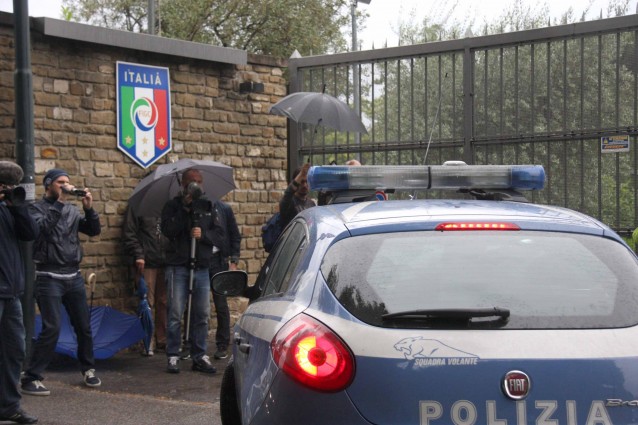
Police raid the Italian national team camp and an earthquake in Emilia-Romagna forces the cancellation of the Italy-Luxembourg Euro warm-up. It’s been a tough week for Italian tifosi, on and off the pitch.
Defender Domenico Criscito left the Euro squad after being implicated in the latest wave of prosecutorial investigations and charges. Meanwhile, Antonio Di Natale emerged as a pale as a ghost after riding out the 5.9 magnitude quake in an elevator.
The latest developments in calcio’s corruption and match fixing scandal have produced 19 arrests, including that of Lazio captain Stefano Mauri and ex-Genoa man Omar Milanetto. Prosecutors in Bari, Cremona, and Napoli have also implicated several dozen high profile players, managers, and club officials. That this mess is taking place only a few years after “calciopoli” — which famously landed Juve in serie B and penalized Milan, Lazio, and Fiorentina — is a potent indictment of the Italian football system and its willingness or ability to reform itself.
Italian authorities and prosecutors inspire confidence in some circles that the metastasizing problem will finally be addressed (read Declan Hill’s blog post here), but I find this optimistic view problematic on a number of levels. Here’s why:
First, the justice system in Italy is utterly dysfunctional. From civil to criminal cases, almost nothing works properly. The country has more than 10,000 laws on the books, that’s more than most, if not all, other countries in the world. Moreover, culprits of egregious crimes are often let off the hook with little more than a slap on the wrist while minor cases take years to resolve. And that’s just the tip of the iceberg.
Second, calcio works exactly like Italian politics. Family and “big man” cliques dominate and actively seek to expand their narrow interests against the common good. From serie A and B all the way to the lowest amateur ranks, this situation makes it almost impossible to develop a fair, equitable, and sustainable solution to the football rot.
Third, Italian sport and society struggle with a culture of cheating that pivots around what may be labeled “situational ethics” and a common sense rationalization that laws are made to be circumvented.
Given this dispiriting local situation and a worrisome rise in match fixing, corruption, and bribery on a global level, the Italian Prime Minister Mario Monti’s recent statement “that it would really benefit the maturity of us Italian citizens if this game was completely suspended” for a couple of years seems like a good idea. It might create the space needed for a soul-searching dialogue aimed at finding long-term solutions to calcio’s spiral of decline.
Categories
4 replies on “The Italian Job: Revisited”
What is depressing is that in most of the scandals Juventus is involved. The reason it is depressing is that Juventus, owned and funded by the Agnelli family, is/was supposed to be representative of the “modern” Italy. Calciopoli of a few years ago confirmed decades old suspicions that Juventus had benefitted from the manipulation of referees etc, and this go around once again seems to involve the team.
Notable is that Juventus’ involvement discredits the racist rants you hear in northern Italy about the southern teams that usually get caught up in the gambling imbroglio, such as Lecce, Catanzaro, etc.
So I agree with the premise of the blog, that there is almost nothing to hope for, as the entire system is broken. You simply cannot slap a few teams on the wrist.
Lastly, a vignet from Rome that exemplifies Italy. A few years back, the politicians finally decided to do the right thing. That is, they imposed REAL fines on those who parked illegally in the city. The fines mirrored those from the USA. In other words, each fine was VERY costly. The idea was that with big fines, the people would comply and the illegal parking would disappear.
What happened? The politicians almost immediately did a 180 because of the backlash from the people and because they, too, did not want to pay the fines. Its within this context that the new calciopoli scandal has emerged. So good luck Italy. My solution? Bans for life to any player involved and disband any teams involved. Sounds like an American fine, right? So don’t count on it.
Rosselli, Your anti-Juve hatred aside, bans for life and dissolution of clubs would probably have an impact if the Italian judicial and sporting establishment had the political will to carry it out. Call me a cynic, but I don’t see any evidence of its existence. In fact, many Italian users’ comments on media sites suggest that many tifosi are hoping that this latest iteration of “calciopoli” has the same effect on the Azzurri at Euro 2012 as it had on the 2006 World Cup!
New York Times, June 3, 2012
“Stain of Scandal Again Taints Italian Soccer”
http://www.nytimes.com/2012/06/03/sports/soccer/stain-of-scandal-again-taints-italian-soccer.html
I totally hate when people involved in a great sport like soccer. They are involved in that kind of problems. Because they should be an example for kids to follow. Sport equals health.